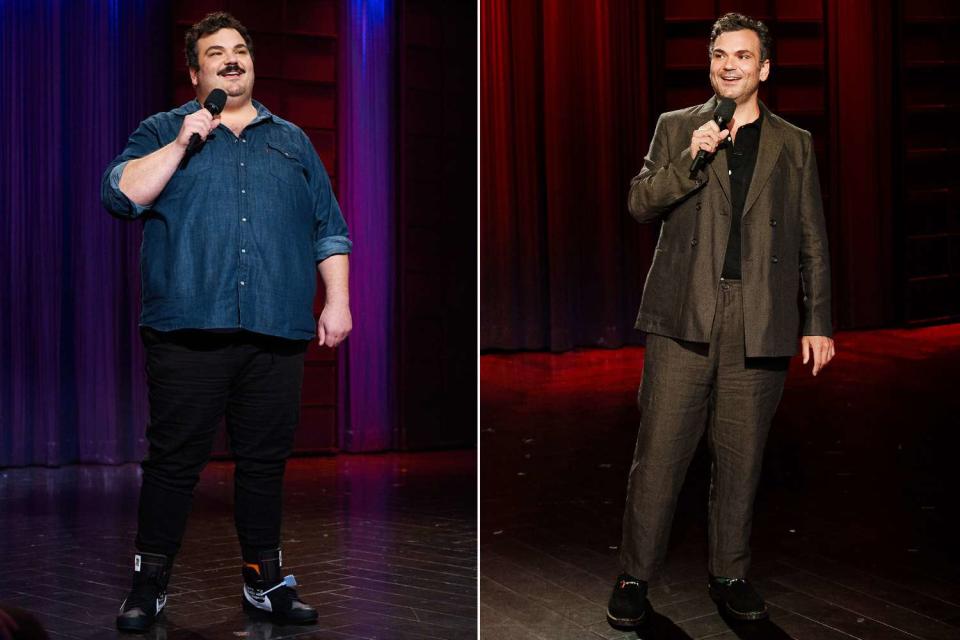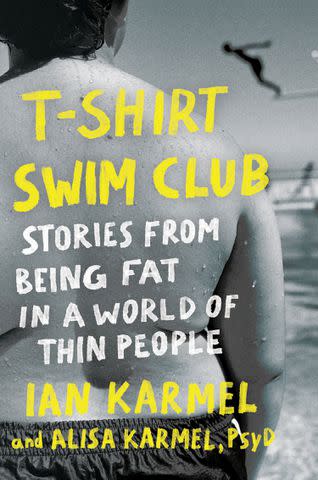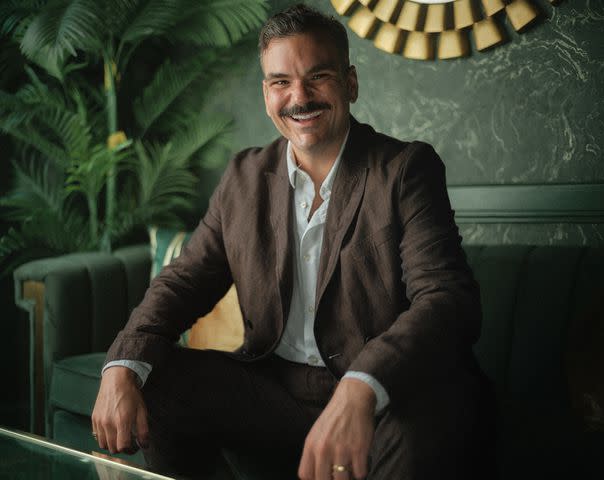Former “Late Late Show ”Writer Ian Karmel Shares Struggle with Weight in New Memoir: When ‘You Learn That You're Fat, You Learn That’s Bad’
In 'T-Shirt Swim Club: Stories from Being Fat in a World of Thin People,' which he co-wrote with his sister, Karmel shares what it's like to grow up in a world made for thin people

Terence Patrick/CBS via Getty (2)
Ian Karmel (left) in 2018, (right) in 2022.Comedian and writer Ian Karmel — who often appeared on The Late Late Show with James Corden, where he was co-head writer — shares his lifelong struggle with his weight in his new memoir, T-Shirt Swim Club: Stories from Being Fat in a World of Thin People, cowritten with his sister
Karmel tells PEOPLE that he and sister Alisa recall what it was like to grow up fat in a world made for thin people, tackling the wellness and diet industry — and specifically fad foods like SnackWells
Karmel talks about collaborating with James Corden on his infamous response to Bill Maher's 2019 fat-shaming clip
Ian Karmel remembers the exact moment he realized he looked different from other kids.
“It was in the pool,” the comedian tells PEOPLE. “You learn that you're fat — and at the same time that you learn that you're fat, you learn that that's a bad thing.”
“And then you put a T-shirt on in the pool with the idea of covering up that fact somehow, or throwing people off the track even though it sticks to your torso and people can immediately tell. But you know, it's an act of desperation in a juvenile mind.”
Karmel, 39, references that experience in the title of his memoir, T-Shirt Swim Club: Stories from Being Fat in a World of Thin People, which he cowrote with his sister, Alisa, a psychologist.

Rodale Books
'T-Shirt Swim Club: Stories from Being Fat in a World of Thin People' by Ian Karmel and Alisa Karmel, PsyD.“We were both fat kids. I dealt with it by becoming a comedian and she dealt with it by getting a doctorate in psychology,”” says Karmel, who was the co-head writer for the Late Late Show with James Corden. “Two very different paths, but both sort of inspired by the same realities of living as a fat person.”
Although he’s since lost nearly half his size since weighing 420 lbs., Karmel says “I'm still a fat guy although I've lost quite a bit of weight. But I was a fat kid, a fat teenager, fat grown-up, fat adult. And I hadn't really seen my story before.”
He was inspired to lose weight during the pandemic after eating “all the take-out food I want for two weeks."
”I realized we weren't flattening the curve. It seems like we might be here a while. So I started ordering much healthier food instead,” he tells PEOPLE, sharing that he'd been frequently ordering from Panda Express.
But after a night at an outdoor bar with friends, “I went to bed after having had a lot to drink and a lot of really salty food. And I woke up at like 5 a.m. with my heart pounding in my chest and I thought I was having a heart attack.”
“I had this realization — it was also the sense of like, 'Oh, here it is. It's finally here. I've been sort of expecting this heart attack like my entire life.' It was less a feeling of like, 'Oh my God, I can't believe this is happening.' Instead, he tells PEOPLE he thought, " 'Oh my God, this is finally happening.' ”
“My heart calmed down and it turned out it was just my very first panic attack. But it was scary enough that I went to the doctor anyway.“
Karmel said he removed unhealthy food from his house, and began hitting 10,000 steps a day in an effort to get healthier. Now 200 lbs. lighter, the comic, writer, and author looks back on his health journey in a world that’s hostile to bigger bodies — and shares how he and his former boss Corden stood up a famous fat-shamer.

Kenny McMillan
Author and comedian Ian Karmel.What made you decide to reference wearing a T-shirt in the pool for your book title?
“Even for a fat kid, I felt graceful in the pool. I felt fast. I felt happy in the pool,” he tells PEOPLE. “I wanted to, with the title, touch on these simultaneous experiences of society telling you that you're fat and that it's a bad thing and that we try to cover it up. But then also, the sense of joy of being in a pool, the sense of like community and togetherness — that's why the ‘swim club’ part of it. Even if all of our experiences are different and they they vary wildly from person to person to person, there's still the sense of community, there are still these shared experiences, these shared feelings that we all go through.”
The PEOPLE Puzzler crossword is here! How quickly can you solve it? Play now!
You also talk about the wellness industry. Why did you want to specifically include SnackWells?
“I wanted to include SnackWells specifically because they have echoed around my subconscious since I was 10 years old, because they were absurd — but they were also delicious,” he tells PEOPLE of the low-fat and fat-free snacks that were popular during the late '90s low-fat diet fad. (They were later discontinued in 2022.)
“They represented this quick fix, this miracle cure — you can still eat cookies and lose weight at the same time. And they were so silly because they didn't have fat, right? They were fat-free and I guess we just didn't know about sugar back then," Karmel quips. "We all collectively fell for it, because they made the box green and we were like, ‘Well that they wouldn't do that unless it was healthy.’ ”

Terence Patrick/CBS via Getty
Ian Karmel on 'The Late Late Show with James Corden.'Bill Maher went on a now-infamous rant in 2019 about how we need to bring back fat-shaming. Can you talk about how you and James Corden addressed that when you were a writer on his show?
“I saw this Bill Maher clip where he was being so condescending, just being like, ‘I almost never go to the doctor. I'm not on any prescription medications. Just put down the burger, fatty.’ ”
So Karmel showed Cordon the clip. “He was pretty disgusted because he's a life-long fat person himself. And he was like, ’Yeah, I wanna talk about this.’ So I was like, ‘Say no more,’ and I went off to my office and wrote this long thing — not just attacking what Bill Maher said, but then also sort of unpacking it and saying like, ‘Here's why that doesn't work. You can't just tell us to lose weight. We all know — every one of us knows — how hard it is to lose weight. Everyone, every single one of us has tried to lose weight. We're all working really hard to try to be healthier people. And this condescending shame [came] from someone who has never experienced it, has never lived their life for one day as a fat person.”
Related: Selena Gomez Seemingly Responds to Body-Shaming Comments After 2023 Golden Globes Appearance
“I wrote it and then I sent it to James and he added some of his own, like, personal story in there and some more jokes and we recorded it and it was one of our more viral clips that didn't involve, you know, Adele singing in a car. I'm really, really proud of it. I was really happy to do something in entertainment that actually I felt stood up for fat people.”
Although they filmed in the same building as Maher, “He never came upstairs. He never fired back on his show, any of that stuff. So I think that's one round that goes to fatty.”
If you could go back in time and say something to 10-year-old you in a T-shirt in a pool, what would you tell him?
“I would say to myself they're not talking about you — which is something that's taken me a long time to learn. I write about this in the book, because it's something that really stuck with me since I started unpacking those feelings. Bullying is the opposite of termites. You know how they say about termites: If you see one, that means [it's] already too late, they're in the foundation? Bullying feels like that," Karmel tells PEOPLE. "The amount of times I actually got bullied as a fat kid — It's not a mountain, but it was enough to make me assume that it was ever-present. If they were saying that to my face, then they must be saying it to each other all the time. They must be having a salon dedicated to how disgusting it is to watch me in gym class.”
Never miss a story — sign up for PEOPLE's free daily newsletter to stay up-to-date on the best of what PEOPLE has to offer, from juicy celebrity news to compelling human-interest stories.
“But mostly people are just talking about, like, what they're gonna have for dinner that night or a movie they saw or a video game they just got or whatever that thing is. And I don't know if 10-year-old me would have internalized that, but I think it would have been a helpful reminder to be like, 'Yo, I know the bullies suck, but they're not like the rest of these people. They're not talking about you and they're not passing judgment on you and they're not being cruel behind your back.' "
Adds Karmel: "It feels like that because society can be so oppressive to fat people," which is why "it's great when people who don't live in fat bodies can be more positive and kind and stand up to people when they see someone being a bully, or they see a system that's not fair. I think it would have been good for 10-year-old me to be like, 'Yo, just keep swimming — and take the T-shirt off when you're ready. '”
For more People news, make sure to sign up for our newsletter!
Read the original article on People.


